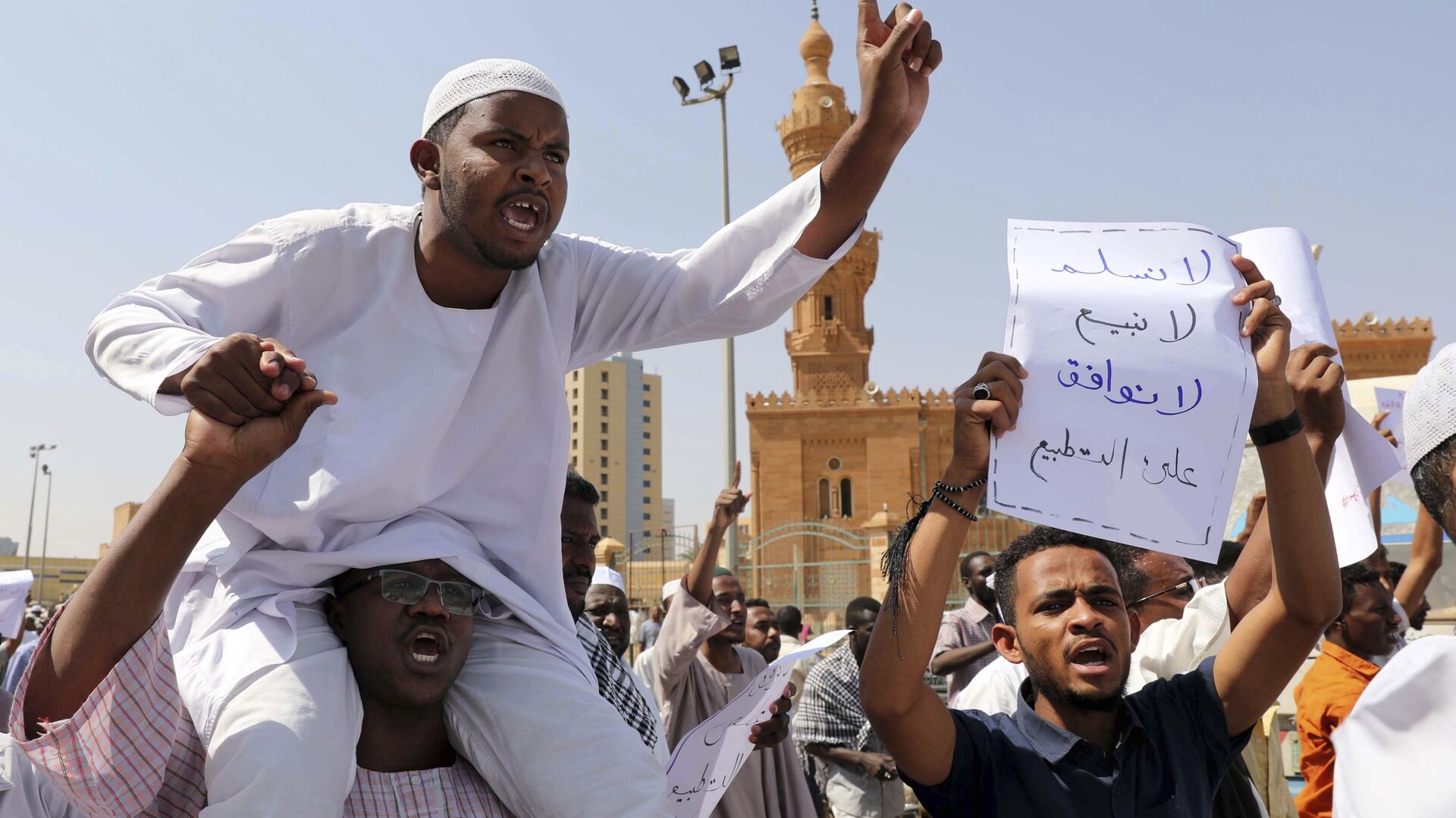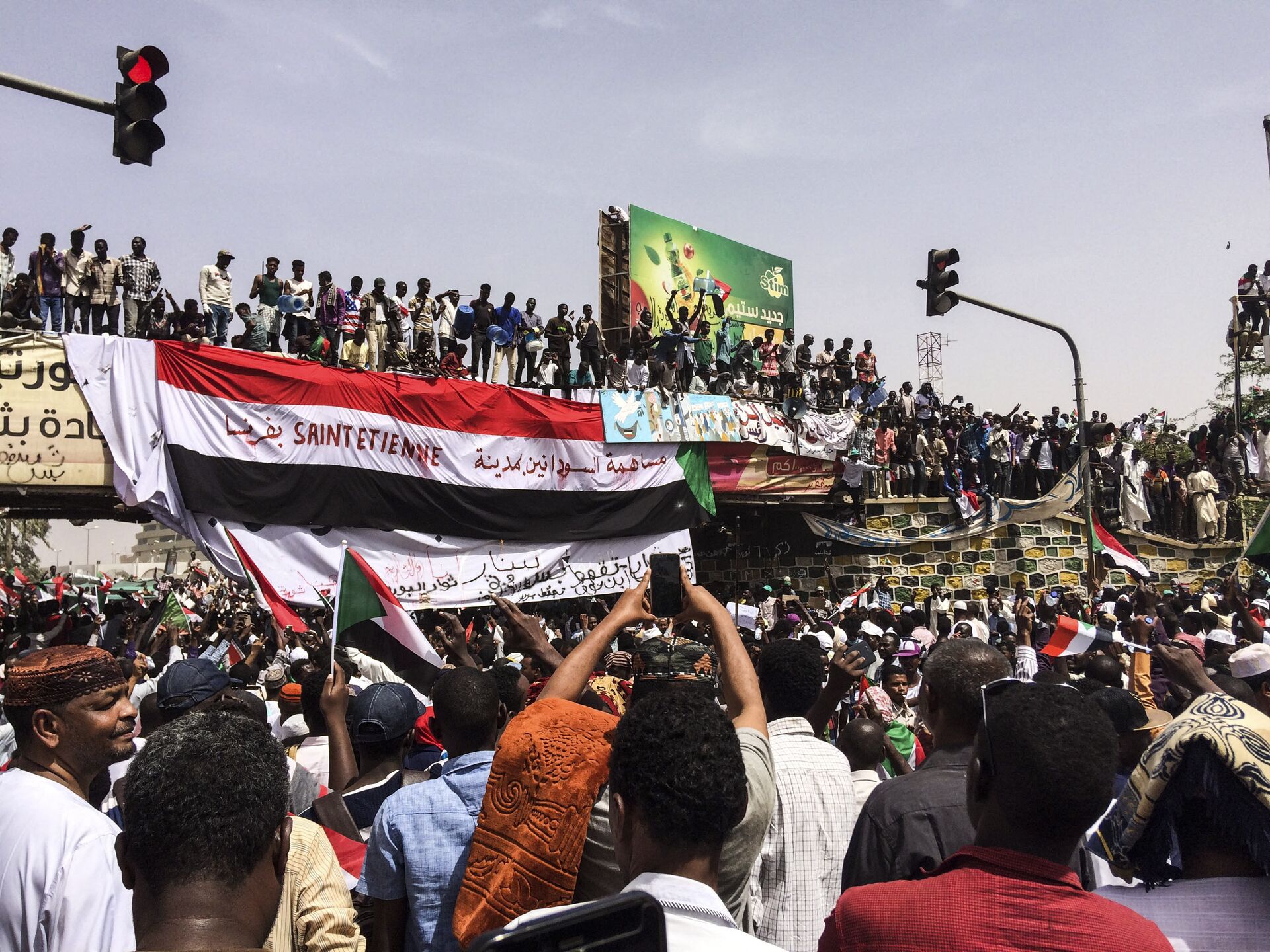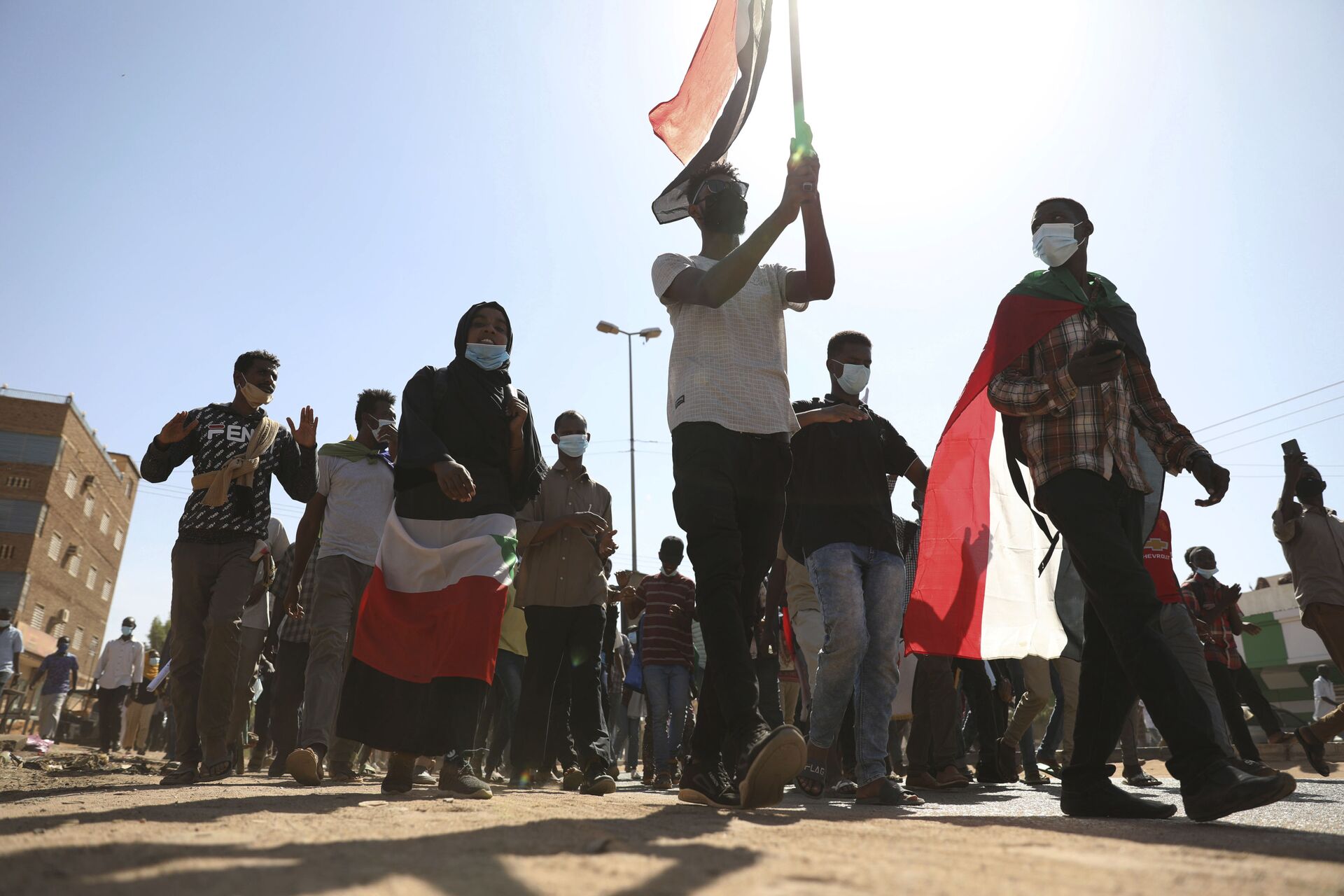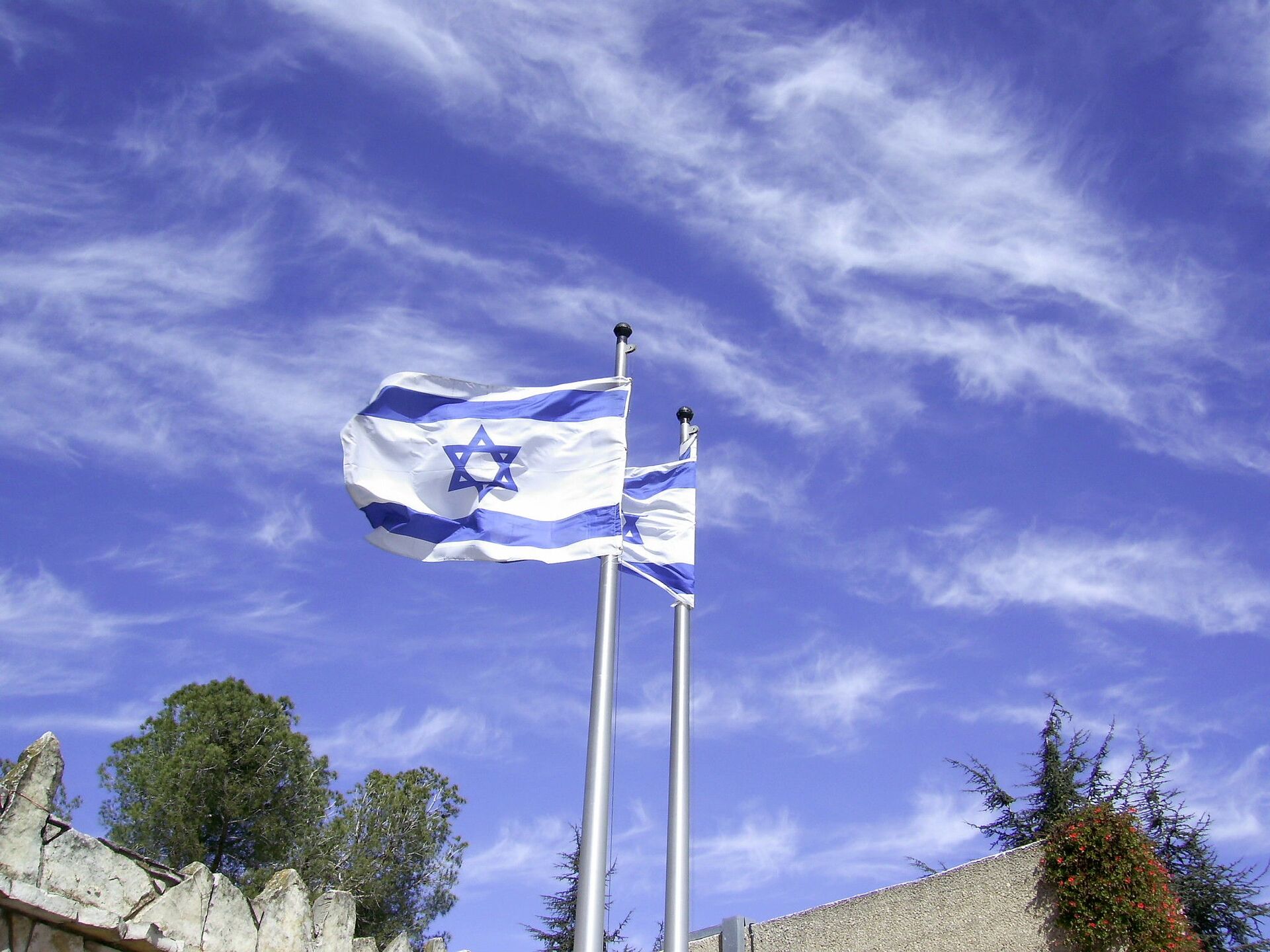https://sputnikglobe.com/20211020/israel--sudan-a-year-after-normalisation-relations-havent-taken-off-heres-why-1090058250.html
Israel & Sudan a Year After Normalisation: Relations Haven't Taken Off, Here's Why
Israel & Sudan a Year After Normalisation: Relations Haven't Taken Off, Here's Why
Sputnik International
Aside from exchanging security delegations, agricultural and technology projects have not been implemented as expected. And a Khartoum-based journalist says... 20.10.2021, Sputnik International
2021-10-20T05:58+0000
2021-10-20T05:58+0000
2021-10-20T08:35+0000
sudan
middle east
africa
israel
https://cdn1.img.sputnikglobe.com/img/07e5/04/06/1082556259_0:161:3071:1888_1920x0_80_0_0_1c888a1438a366dddb419b65ce02b06a.jpg
Just a year ago, spirits were up in Israel as Sudan became the third Muslim nation to recently normalise relations with the Jewish state, following the footsteps of the United Arab Emirates and Bahrain, who inked their own pacts in September 2020.Since then, the two states have exchanged delegations and discussed areas where they can boost cooperation, putting an emphasis on defence and the military.Israel helped treat a top Sudanese official suffering from COVID-19, and Khartoum got tough on the Islamic group Hamas, who has used Sudan as a training ground for its militants.Nothing Has Been DoneBut Mohammed Amin, a Khartoum-based journalist, says that one year down the line nothing has really been achieved and that the normalisation pact between the nations is still up in the air.Sudan is currently under pressure to form that assembly and ratify the agreement. The UAE, who has been sponsoring Khartoum for years and who objected to the latter's relations with Hamas and the Muslim Brotherhood movement - deemed a terrorist organisation by a number of regional powers - would like to see Sudan ratify its normalisation pact with Tel Aviv.The United States, who brokered the deal a year ago and who removed Khartoum from its list of state sponsors of terror in exchange for the pact, is also eyeing the situation with concern, and might reconsider its position on Sudan should the latter decide to make an about-face on its decision.Amin calls that policy a "provocation and blackmail" and he says it is up to the Sudanese people, not outside players, to decide what's good for the country.Fear of the Masses?The problem is that the way it stands now, the Sudanese public is largely divided.Others, however, think differently. Soon after the agreement between Israel and Sudan was announced hundreds poured into the streets to express their anger at the government for going ahead with the move.That anger, says Amin, makes the current government, which has been facing protests in recent days, "hesitant" about signing the ratification with Israel. Such a move could provoke the masses and exacerbate the already fragile political situation in the country.Amin believes that ratification is not worth the headache, especially given that normalisation hasn't brought Sudan any "tangible results".Although Israel had promised it would invest in Sudan's agricultural sector and pour money into a number of technological projects, not much has actually been done, and unlike relations with the UAE, that have seen trade blooming, ties between the African nation and the Jewish state are almost non-existent.
sudan
africa
israel
Sputnik International
feedback@sputniknews.com
+74956456601
MIA „Rosiya Segodnya“
2021
News
en_EN
Sputnik International
feedback@sputniknews.com
+74956456601
MIA „Rosiya Segodnya“
Sputnik International
feedback@sputniknews.com
+74956456601
MIA „Rosiya Segodnya“
sudan, middle east, israel
sudan, middle east, israel
Israel & Sudan a Year After Normalisation: Relations Haven't Taken Off, Here's Why
05:58 GMT 20.10.2021 (Updated: 08:35 GMT 20.10.2021) Aside from exchanging security delegations, agricultural and technology projects have not been implemented as expected. And a Khartoum-based journalist says it's due to the Sudanese government being worried that ratification of the deal will prompt anger around the country and potentially cause it to fall.
Just a year ago, spirits were up in Israel as
Sudan became the third Muslim nation to recently normalise relations with the Jewish state, following the footsteps of the United Arab Emirates and Bahrain, who inked their own pacts in September 2020.
Since then, the two states
have exchanged delegations and discussed areas where they can boost cooperation, putting an emphasis on defence and the military.
Israel helped treat a top Sudanese official suffering from COVID-19, and Khartoum got tough on the Islamic group Hamas, who has used Sudan as a training ground for its militants.
But Mohammed Amin, a Khartoum-based journalist, says that one year down the line
nothing has really been achieved and that the normalisation pact between the nations is still up in the air.
"The normalisation pact has not been activated yet, and the government insists that it is an issue that needs to be ratified by a special assembly. But the problem is that it hasn't even been formed".
Sudan is currently under pressure to form that assembly and ratify the agreement. The UAE, who
has been sponsoring Khartoum for years and who objected to the latter's relations with Hamas and the Muslim Brotherhood movement - deemed a terrorist organisation by a number of regional powers - would like to see Sudan ratify its normalisation pact with Tel Aviv.
The United States, who brokered the deal a year ago and who
removed Khartoum from its list of state sponsors of terror in exchange for the pact, is also eyeing the situation with concern, and might reconsider its position on Sudan should the latter decide to make an about-face on its decision.
Amin calls that policy a "provocation and blackmail" and he says it is up to the Sudanese people, not outside players, to decide what's good for the country.
The problem is that the way it stands now, the Sudanese public is largely divided.
"Some in Sudan, who oppose Islamic ideas and ideology, are supportive of the pact. They are not against the Palestinians, but they also think Khartoum should normalise its relations with Israel", explained the journalist.
Others, however, think differently. Soon after the agreement between Israel and Sudan was announced hundreds poured into the streets to express their anger at the government for going ahead with the move.
That anger, says Amin, makes the current government, which has been facing protests in recent days, "hesitant" about signing the ratification with Israel. Such a move could provoke the masses and exacerbate the already fragile political situation in the country.
"If the legislative committee, which is currently split, recognises the normalisation pact, it will lead to big resistance against the government. It will further radicalise the Sunni Muslim community and will bring many problems to Sudan".
Amin believes that ratification is not worth the headache, especially given that normalisation hasn't brought Sudan any "tangible results".
Although Israel had promised it would invest in Sudan's agricultural sector and pour money into a number of technological projects, not much has actually been done, and unlike relations with the UAE, that have seen
trade blooming, ties between the African nation and the Jewish state are almost non-existent.
"Sudan has shifted its foreign policy and moved away from Iran and the support of its Muslim brothers to the embrace of the West. The idea was to get some economic gains. But so far we haven't seen any major achievements".
"The normalisation pact has not been activated yet, and the government insists that it is an issue that needs to be ratified by a special assembly. But the problem is that it hasn't even been formed"."In the past, during the days of [former President] Omar Al Bashir, Sudan also tried to get closer to the West but after he realised that his achievements were minimal, he backtracked from that policy. And this time around Sudan might want to do that again".







